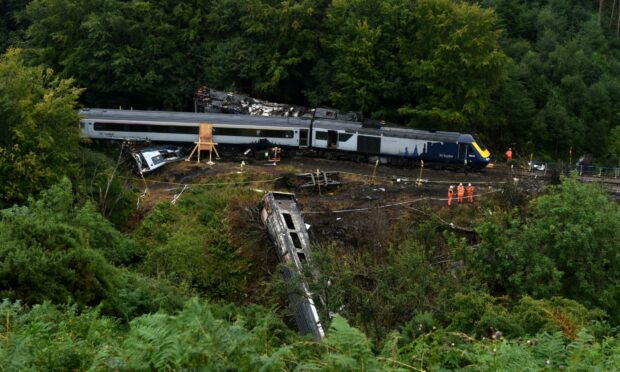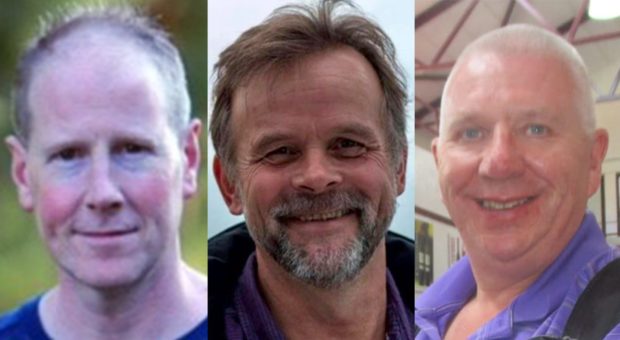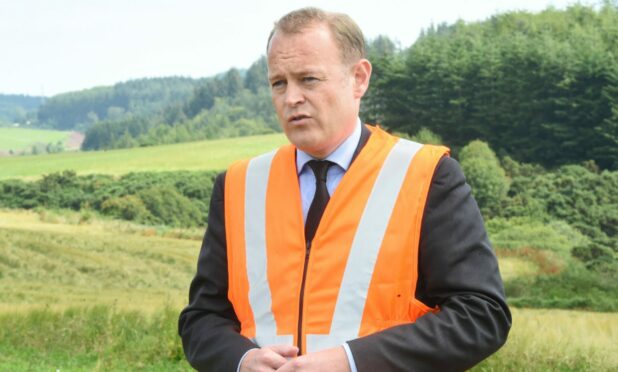A rail union chief plans to move ahead with a boycott by drivers of the type of train used in the Stonehaven rail tragedy.
Kevin Lindsay, organiser at the Aslef union, which represents more than 21,000 train drivers, raised serious concerns about the High Speed Trains which date back to the 1970s.
In the Scottish Parliament on Tuesday, he said the union is preparing to “boycott” the vehicles from August 12.
The union had warned last year that action would be taken by this date unless there were “significant improvements” to the trains.
The new warning comes two days since it emerged only two of the 20 recommended improvements made in the wake of the crash have been implemented so far.
In Holyrood, MSPs were also told:
- The High Speed Trains should “never have been in Scotland”.
- The vehicles are currently on lease until 2030.
- It is an “absolute scandal” only two recommendations have been implemented.
- Lack of action could lead to another potential rail tragedy.
Brett McCullough, Christopher Stuchbury and Donald Dinnie died in the Stonehaven rail on August 12, 2020.
The 6.38am Aberdeen to Glasgow train left the tracks at Carmont, near Stonehaven after hitting a landslip caused by a night of extreme rainfall.
Rail boycott planned
Mr Lindsay said the union has so far “not received enough information” on improvements to the type of train involved in the accident.
He added: “We’ve got further meetings with the Carmont HST steering group, and we will let it run its course.
“But the likelihood come August 12, is I will instruct all our members not to touch these trains based on their crashworthiness.
“The crashworthiness of these trains is from the 1970s. They do not meet modern standards. These trains should never have been in Scotland.”
His concerns were echoed by Mick Hogg, RMT union chief in Scotland, who said the age of the trains is “absolute nonsense”.
He added: “What we actually need is more investment and what we don’t need is 50-year-old trains.”
The remarks follow concerns about cuts to Network Rail’s budget.
The Scottish Government’s rail budget for the upkeep of rail infrastructure – including signals and track – has been reduced by £150 million over the past four years.
‘Those trains are safe’
Alex Hynes, managing director of ScotRail, told MSPs the High Speed Trains are currently on lease until 2030 and said the vehicles are safe.
The rail operator is looking for options to replace the vehicles earlier. But that plan is part of reducing carbon rather than because of safety.
He said: “We’re aware of Aslef’s concerns in relation to the safety of the High Speed Trains.
“Those trains are safe, they have a good safety record, they meet all the requirements to operate safely on the Great Britain rail network.
“But we recognise Aslef’s concerns and we’re working with them constructively on those concerns.
“In the coming weeks we are actually going to modify those trains in line with the Rail Accident Investigation Branch (RAIB) report which was published in March of last year.”
The report revealed only two of the recommendations made in the aftermath of the fatal August 2020 crash have been closed – meaning action has been taken to implement them.
The remaining 18 were still open as of March, meaning they are still under consideration.
The recommendations range from improvement on the train itself, to rail management, to drainage.
‘Absolute scandal’
Mr Hogg said it was an “absolute scandal” that so few actions have been completed.
It has all the hallmarks of another potential sad accident happening again.
– RMT’s Mick Hogg
He added: “The rail unions and the families who have lost loved ones will be appalled in terms of the recommendations that have been addressed so far.
“It has all the hallmarks of another potential sad accident happening again if we don’t learn the lessons of the railway accident.”
Mr Lindsay, a fellow trade union boss, said it is “not unusual” at this stage to only have two recommendations completed.
“Whether it’s acceptable is another argument but it’s not unusual,” he added.
Mr Hynes said “immediate action” was taken at the time to avoid another tragic accident.
“We’ve already made the network a lot safer but we need to make sure we track all those 20 recommendations to conclusion”, he added.



Conversation